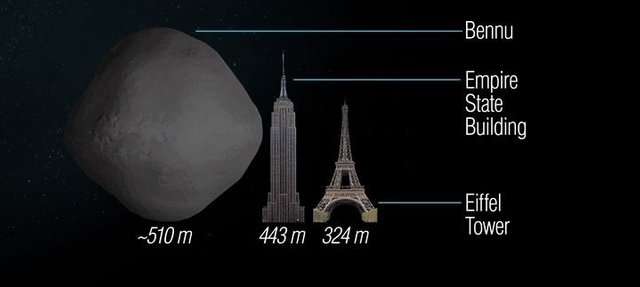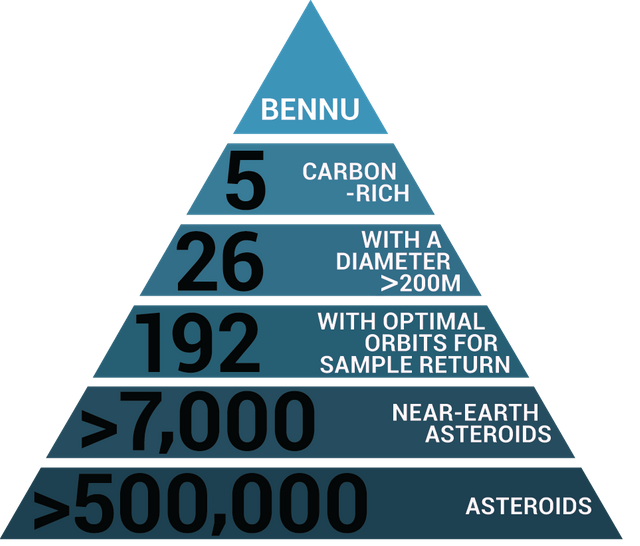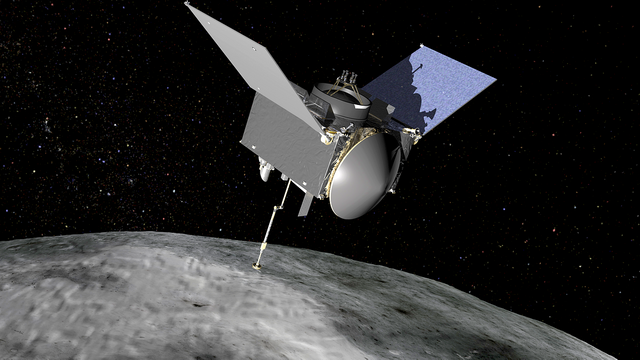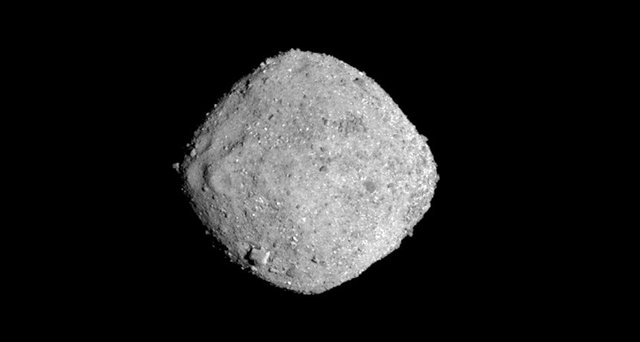OSIRIS-REx's mission -NASA's attempt to collect a sample from an asteroid
There are many mysteries about the universe. According to NASA, Bennu is like a time capsule, made out of the things that formed our world. NASA is planning to send Osiris to get a sample of Bennu.
What this Sample will Do for Us
Every rock on Earth has been changed from how it originally was with eroding, heat, and other kinds of things that can happen. By collecting a sample, we will have a pristine sample of that rock to experiment on for years.
Doing research on how exactly it moves will help us to identify if an asteroid is going to hit us.
Why is Bennu Important? Why do We Care?
To explain this, I need to start with explaining the beginning, at least according to NASA. Their hypothesis, a Atheist idea, is that 4.6 billion years ago our solar system was formed in nebula and planets are made out of lots of rocks forming together. Then the sun formed and the planets and asteroids starting orbiting around the sun. Of course, since we were not there, we do not know for sure and this is all a hypothesis.
They believe that long time Jupiter's gravity field caused asteroids to leave the asteroid belt and fly towards Earth, that hit it ago brought water and organisms to Earth. This is only one of many ideas on how life began on Earth. Although in this hypothesis Jupiter causes asteroids to hit Earth, as of right now, it keeps asteroid from hitting Earth, because of how large it is, so you don't need to worry about asteroids hitting us.
A sample from Bennu may tell us more.
Problems and Questions about this Hypothesis
-How did the nebula get there
-If everything was made out of the same thing, how did some asteroids not transform into planets? How did some get more carbon than others?
-Nature randomizes, not organizes. Then how did everything in our solar system become organized?
-How did Earth just happen to get in the right spot?
-Why is there a sun? If everything is made in the nebula out of the same thing, how is there a sun, and why is Jupiter made out of gas instead of rock? One might debate that it's because dust spiraled and collapsed on itself to form the sun, but that would bring us the question of how did dust became hot gas?
The good thing is that a sample of Bennu might help answer some questions and give some insight into space and how our solar system is made.
Why was Bennu Picked
Another reason why we care and why Bennu was picked is because Bennu is dark, which means it probably has lots of carbon. Carbon is an important element in things necessary for life such as bones, proteins, and carbohydrates. Which makes it a rare type B asteroid.
Bennu is fairly close at 1.3 AU away (1 AU = distance between the sun and Earth). When they were picking out the asteroid, they needed one that was no farther than 1.6 AU, which is the limit of where a spacecraft can go in this point in time. They also wanted an asteroid with an orbit similar to Earth's.
How fast asteroids are depend upon how large they are. The smaller asteroids move faster. Bennu is about the right size that it would be slow enough to collect a sample from.
source
Bennu is like a time capsule, it's a pristine rock that has never been exposed to Earth's atmosphere, and such a sample would be very helpful for the scientists to learn.
This is a pyramid picture to help visualize the factors that went into choosing Bennu:
source
Timeline#
| Action | Date |
|---|---|
| Launch from Eath | Sep 8, 2016 |
| Arrive to Bennu | Dec 3, 2018 |
| Sample Collected | Jul 4, 2020 |
| Leave from Bennu | Mar 3, 2021 |
| Return to Earth | Sep 24, 2023 |
Launch
The rocket that sent it up burned kerosene and liquid oxygen as fuel.
Arrive
It went into orbit trying to catch up with Bennu. This will be the smallest thing a satellite has ever orbited. Here is a list of some of the things it will do when it's in orbit around Bennu:
- Osiris will observe Bunnu, recording if it has natural satellites and its acceleration.
- Osiris will collect data about Bennu's geography to create a map of it.
The data will help with detecting asteroids and where they will go. Once it's done mapping Bennu, it will find the right place to collect a sample.
Sample
It will select a sample site and do a TAG (Touch and Go).
The sample collecting mechanism will touch the surface for 5 seconds and release nitrogen gas that will loosen the rock and it will go into the collector.
It will collect 60 grams to 2 kilograms of sample and will be stored in a sample return capsule (SRC) .
Return
FOur hours before reaching Earth's atmosphere, Osiris Rex will release the SRC towards Earth. The SRC will land in the Utah desert.
More Data About Bennu
Equatorial Diameter: ~500 m
Polar Diameter: ~510 m
Average Speed: 63,000 mph
Rotation Period: 4.3 hrs
Orbital Period: 1.2 yrs
Orbital Inclination: 6 degrees
Earth Approach: Bennu comes close to Earth every 6 yrs
(info about this data is from https://www.asteroidmission.org/objectives/bennu/)

